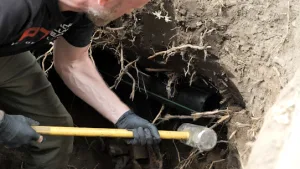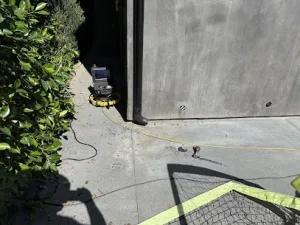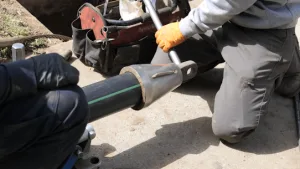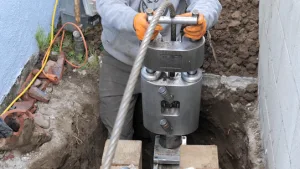As technology continues to advance, smart home systems are becoming more common, and plumbing is no exception. These advancements not only enhance convenience and efficiency but also significantly reduce the environmental impact of water usage in modern homes. Modern homeowners are increasingly looking for ways to integrate technology into their homes to enhance convenience, improve efficiency, and reduce water waste. Smart plumbing systems offer innovative solutions that help you monitor and manage your home’s water usage, detect leaks early, and even automate tasks like water heating.
Plumbing Technology Advancements
Plumbing technology has come a long way in recent years, with advancements in materials, design, and functionality. One of the most significant developments is the integration of smart technology into plumbing systems. Smart plumbing systems use sensors, IoT devices, and sophisticated software to monitor and control water usage, flow, and temperature in real-time. This technology enables homeowners and businesses to optimize their water usage, reduce waste, and save on utility bills. Additionally, smart plumbing systems can detect leaks and alert users to potential issues, reducing the risk of water damage and costly repairs.
Let’s explore the latest smart plumbing technology for modern homes and how it can make your life easier.
1. Smart Water Leak Detectors
Water leaks can cause significant damage to your home if they go unnoticed for too long. Smart water leak detectors are one of the most popular innovations in plumbing technology, helping homeowners detect leaks early before they turn into costly disasters.
- How They Work: Smart water leak detectors are small sensors placed near areas prone to leaks, such as under sinks, near washing machines, or around water heaters. These devices monitor for excess moisture or changes in water flow and send instant alerts to your smartphone when a leak is detected.
- Benefits: Early detection of leaks can prevent water damage, mold growth, and expensive repairs. Some systems even shut off the water supply automatically when a leak is detected, providing an added layer of protection, which is a significant advantage for any plumbing business.
- Popular Options: Devices like the Flo by Moen, Honeywell Lyric, and Phyn Plus are examples of smart water leak detectors that offer real-time monitoring and notifications via mobile apps.
2. Smart Water Shut-Off Valves
Building on the functionality of leak detectors, smart water shut-off valves take leak prevention to the next level by integrating seamlessly into your plumbing system. These devices can automatically stop water flow to your home in the event of a leak, protecting your property from water damage.
- How They Work: Smart shut-off valves are installed on your main water line and work in conjunction with smart leak detectors or independently. When a leak is detected, the system shuts off the water supply to prevent further leakage. You can also control the valve remotely through a smartphone app.
- Benefits: By preventing significant water loss and damage, smart shut-off valves can save homeowners thousands of dollars in repairs. These devices also give you peace of mind, especially if you’re away from home for an extended period.
- Popular Options: The Flo by Moen Smart Water Shutoff and Phyn Smart Water Assistant are popular choices that provide real-time water monitoring, remote control, and automatic shut-off in emergencies.
3. Smart Water Heaters
Traditional water heaters can be inefficient and consume more energy than necessary. Smart water heaters offer a high-tech solution by allowing you to control your water heating system remotely and improve energy efficiency.
- How They Work: Smart water heaters are equipped with Wi-Fi connectivity and sensors that allow you to monitor and control your hot water usage from your smartphone. You can adjust the temperature, set heating schedules, and receive alerts if there’s a problem with the system, such as a leak or malfunction.
- Benefits: With smart controls, you can optimize your water heater’s performance to save on energy costs. By scheduling hot water use around your needs, you avoid heating water when it’s not necessary, which reduces waste. You’ll also receive maintenance reminders and can track your energy consumption. By adopting smart water heaters, homeowners contribute to a sustainable and efficient future by optimizing energy use and reducing waste.
- Popular Options: Some of the most advanced smart water heaters include the Rheem EcoNet, Rinnai Sensei SE+ Tankless Water Heater, and the A. O. Smith Signature Series, all of which offer remote control, energy usage tracking, and leak detection features.
4. Smart Showers
Imagine starting your day with the perfect shower temperature every morning, thanks to smart technology. Smart showers allow you to control your shower’s water temperature, flow rate, and duration from your smartphone or through voice commands with virtual assistants like Alexa or Google Assistant.
- How They Work: Smart showers are equipped with digital controls and Wi-Fi connectivity, allowing you to preset your ideal water temperature, customize shower modes, and even monitor your water usage. You can start your shower remotely or adjust the settings while you’re in the shower for the perfect experience every time. Unlike traditional plumbing systems, smart showers offer real-time control and customization, enhancing both convenience and water conservation.
- Benefits: Smart showers help conserve water by allowing you to monitor usage and set limits. They also offer personalized experiences, where each family member can save their preferred shower settings, from temperature to flow rate.
- Popular Options: Kohler Konnect, U by Moen Smart Shower, and Delta VoiceIQ are popular smart shower systems that combine luxury with water-saving features, offering complete control over your shower experience.
5. Smart Irrigation Systems
Watering your lawn or garden is important, but traditional irrigation systems can waste water by running too long or activating during rain. Smart irrigation systems help you manage your outdoor water usage more efficiently by optimizing when and how much water your plants need.
- How They Work: Smart irrigation systems are connected to local weather forecasts and soil moisture sensors to determine the optimal watering schedule. The system adjusts watering times based on real-time weather data, preventing overwatering or watering during rain.
- Benefits: With smart irrigation, you can save significant amounts of water while ensuring that your plants get exactly what they need. These systems also reduce your water bill and help create a more sustainable home by preventing water waste. These smart irrigation systems are an essential part of modern plumbing services, ensuring efficient water use and sustainability.
- Popular Options: The Rachio Smart Sprinkler Controller and RainMachine Smart Wi-Fi Irrigation Controller are widely used smart irrigation systems that provide real-time data, remote control, and weather-based watering adjustments.
6. Touchless Faucets
Touchless faucets are no longer just for commercial restrooms—they’ve made their way into modern homes, bringing convenience and improved hygiene to kitchens and bathrooms.
- How They Work: These faucets are equipped with motion sensors that activate water flow when you place your hands or an object under the spout. You can control the water flow and temperature without touching the faucet, which is particularly useful in kitchens when your hands are dirty or full.
- Benefits: Touchless faucets reduce the spread of germs and bacteria, making them a more hygienic option for your home. They also help conserve water by automatically turning off when you move away from the sensor. Touchless faucets are becoming a standard feature in modern plumbing services, offering both convenience and improved hygiene.
- Popular Options: Moen and Kohler are leading manufacturers of touchless faucets, offering models that can also be controlled via voice commands or smartphone apps for an even more seamless experience.
7. Smart Water Monitoring Systems
Smart water monitoring systems give you detailed insights into your home’s water usage. These devices track water consumption in real time, helping you identify inefficiencies and potential leaks.
- How They Work: Smart water monitors are installed on your main water line and provide data on how much water each fixture and appliance in your home uses. You can access this information via an app to see where you can reduce water usage or detect unusual patterns that may indicate a leak.
- Benefits: By keeping track of your water usage, you can find opportunities to conserve water and lower your utility bills. These systems also alert you to potential problems, such as leaks or overuse, before they turn into bigger issues.
- Popular Options: Products like the Flume Smart Water Monitor and Phyn Smart Water Assistant allow homeowners to track water usage, detect leaks, and receive real-time alerts about water consumption.
8. Water Management and Conservation
Water management and conservation are critical components of sustainable and efficient plumbing systems. Greywater recycling systems, for example, can collect and treat wastewater from sinks, showers, and washing machines, allowing it to be reused for irrigation, toilet flushing, and other non-potable purposes. Rainwater harvesting systems can also collect and store rainwater for use in laundry, toilet flushing, and irrigation, reducing the demand on freshwater sources. Furthermore, low-flow fixtures and appliances can significantly reduce water consumption, making them an essential part of any water conservation strategy.
9. Efficient Plumbing Fixtures
Efficient plumbing fixtures are designed to reduce water consumption while maintaining performance. Low-flow showerheads, faucets, and toilets use advanced technologies such as aerators and sensors to minimize water usage. For instance, low-flow showerheads can reduce water consumption by up to 30% while still providing a satisfying shower experience. Similarly, low-flow toilets use advanced flushing mechanisms to reduce water usage while maintaining effective waste removal. By installing efficient plumbing fixtures, homeowners and businesses can significantly reduce their water consumption and lower their utility bills.
10. Plumbing Industry Trends
The plumbing industry is constantly evolving, with new trends and technologies emerging every year. One of the most significant trends is the increasing adoption of smart plumbing systems, which offer enhanced control, efficiency, and insight into water usage and management. Another trend is the growing demand for sustainable and eco-friendly plumbing solutions, such as greywater recycling systems and rainwater harvesting systems. Additionally, the use of advanced materials and technologies, such as PEX pipes and 3D printing, is becoming more widespread in the plumbing industry.
11. Innovations in Plumbing Systems
Innovations in plumbing systems are transforming the way we manage water usage and waste. One of the most significant innovations is the development of self-cleaning plumbing fixtures, which use advanced technologies such as UV light disinfection and antimicrobial coatings to eliminate germs and bacteria. Another innovation is the use of advanced sensors and algorithms to detect leaks and predict maintenance needs, reducing the risk of water damage and costly repairs. Furthermore, the integration of plumbing systems with smart home ecosystems is becoming more common, enabling homeowners to control and monitor their plumbing systems remotely.
Conclusion
The latest smart plumbing technology offers modern homeowners a wealth of benefits, from preventing leaks to improving water efficiency and convenience. By integrating smart water systems, you can save money on utility bills, protect your home from water damage, and enjoy greater control over your water usage. Whether it’s smart leak detectors, automated shut-off valves, or personalized shower systems, these innovations are transforming the way we manage plumbing in our homes.
If you’re ready to upgrade your plumbing with smart technology, contact the Pacific Plumbing Team for expert advice and installation services. We can help you choose the best systems to meet your needs and ensure your home’s plumbing is as efficient and modern as possible.



